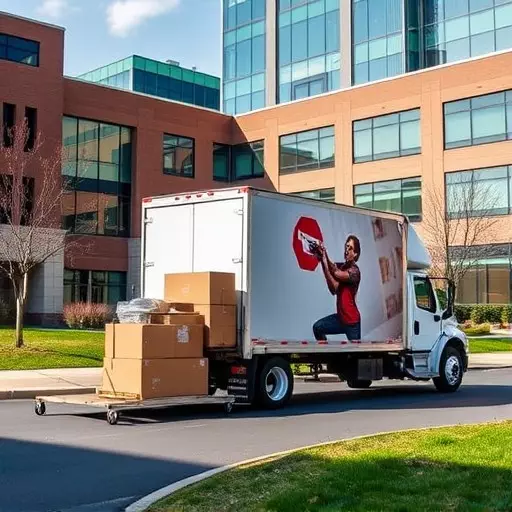Relocating an office in Holland, Ohio requires navigating complex legal landscape. Office relocation services specialize in permits, zoning, employee rights, safety, and environmental laws, offering seamless corporate moving logistics. A comprehensive checklist ensures data protection, compliance with building codes, and smooth transition. Prioritizing these aspects safeguards business interests, minimizes disruptions, and guarantees a successful move.
“Navigating an office relocation involves more than just packing boxes. For seamless and legally compliant moves, especially with corporate moving logistics in Holland, Ohio, understanding the intricate web of regulations is paramount. This comprehensive guide delves into the essential aspects of office relocation compliance.
From securing permits to safeguarding data, we explore a detailed checklist covering local, state, and federal requirements. Learn how to ensure employee rights, adhere to environmental standards, and maintain security during this pivotal process, transforming your corporate move into a well-oiled machine.”
- Understanding Legal Requirements for Office Relocation
- Obtaining Necessary Permits and Licenses
- Compliance with Local and State Regulations
- Labor Laws and Employee Rights During Moving Processes
- Data Protection and Security Measures
- Environmental Considerations for Corporate Moves
- Post-Relocation: Ensuring Continued Legal Compliance
Understanding Legal Requirements for Office Relocation
When planning an office relocation in Holland, Ohio, understanding and adhering to legal requirements is paramount for a smooth process. Many aspects come into play, from local zoning laws to employee rights and safety standards. Office relocation services often have extensive knowledge of these regulations, ensuring compliance throughout the move.
A comprehensive office relocation checklist should include verifying permits, checking building codes, and understanding workers’ compensation insurance. Corporate moving logistics also encompass data protection, especially when transferring sensitive business information. Ensuring that all legal bases are covered not only minimizes risks but also guarantees a successful transition for your Holland-based business.
Obtaining Necessary Permits and Licenses
When planning an office relocation in Holland, Ohio, one of the crucial steps in ensuring a smooth transition is obtaining all necessary permits and licenses. This process often involves navigating local regulations to comply with zoning laws, business operation permits, and health and safety inspections. Professional office relocation services can assist in this phase by providing expertise in corporate moving logistics, allowing businesses to focus on their core operations.
A comprehensive office relocation checklist should include identifying relevant permits required for the new location, updating business registrations, and ensuring compliance with local building codes. These measures not only facilitate a legal move but also contribute to maintaining a seamless workflow during the transition, ultimately enhancing the efficiency of your corporate moving experience.
Compliance with Local and State Regulations
When planning an office relocation in Holland, Ohio, ensuring compliance with local and state regulations is paramount for a smooth process. These rules govern everything from permitting to waste disposal, protecting both employees and the community during the move. Office relocation services Holland Ohio professionals are well-versed in these laws and can assist corporations in navigating complex permit requirements, ensuring all legal bases are covered.
An extensive office relocation checklist is crucial for staying compliant. This includes securing necessary permits from local authorities, adhering to environmental protection standards, and following guidelines for handling hazardous materials if present. Effective corporate moving logistics involves coordinating with vendors and employees to implement these regulations seamlessly, minimizing disruptions and potential legal repercussions.
Labor Laws and Employee Rights During Moving Processes
During an office relocation, it’s crucial to understand and adhere to labor laws and employee rights. In Ohio, employers must comply with state and federal regulations that protect workers during such transitions. This includes providing adequate notice of the move, ensuring safe transportation, and maintaining fair wages and benefits throughout the process. Employee rights extend to protection from discrimination or retaliation for exercising their rights related to the relocation.
An office relocation checklist should include verifying compliance with labor laws as a key component of corporate moving logistics. This involves reviewing leave policies, addressing concerns about job security, and confirming that all necessary permits and insurance are in place. By prioritizing these legal considerations, businesses can ensure a smooth transition for both employees and the company as a whole, enhancing the overall efficiency of the office relocation services Holland Ohio offers.
Data Protection and Security Measures
When planning an office relocation in Holland, Ohio, one of the most critical aspects to consider is data protection and security measures. As you pack up and transport sensitive corporate information, ensuring compliance with data privacy laws becomes paramount. An extensive office relocation checklist should include steps to safeguard digital assets and physical documents throughout the process.
Engaging professional office relocation services in Holland, Ohio, can significantly enhance these efforts. Expert movers specialize in corporate moving logistics and employ advanced security protocols for data protection. They offer secure storage solutions, encryption technologies, and trained personnel to handle sensitive materials, minimizing risks associated with your valuable business information during transit.
Environmental Considerations for Corporate Moves
When planning an office relocation, especially in Holland, Ohio, utilizing professional office relocation services is paramount to ensure a smooth transition. One critical aspect that often gets overlooked is environmental compliance—a key component of any successful corporate move. An extensive office relocation checklist should include assessments for potential ecological impacts during the logistics process.
This involves evaluating the old and new locations for any hazards or sensitivities, such as proximity to water bodies, protected habitats, or areas with stringent environmental regulations. Professional movers with expertise in corporate moving logistics are trained to handle these situations, ensuring that every step of the move adheres to local, state, and federal environmental laws and guidelines.
Post-Relocation: Ensuring Continued Legal Compliance
After successfully completing an office relocation in Holland, Ohio, it’s crucial to maintain legal compliance throughout the post-relocation period. This involves ensuring that all necessary permits and licenses for the new location are up-to-date. Companies should also review and update their local, state, and federal tax registrations, as well as any relevant business regulations specific to their industry.
A comprehensive office relocation checklist is essential for this phase. It should include tasks like confirming utility connections, registering for local business taxes, updating mailing addresses with relevant government agencies and stakeholders, and ensuring compliance with data privacy laws when transferring or disposing of old equipment. Efficient corporate moving logistics planning will help ensure a smooth transition and minimize legal risks associated with the move.


